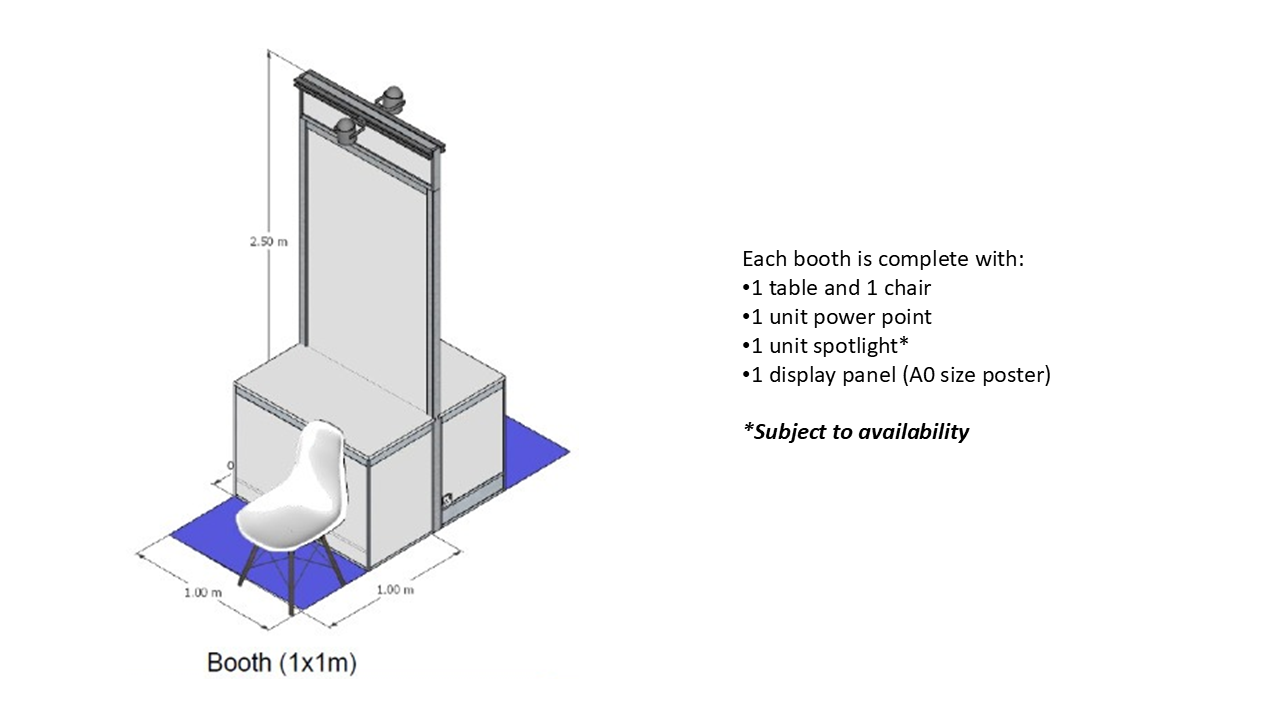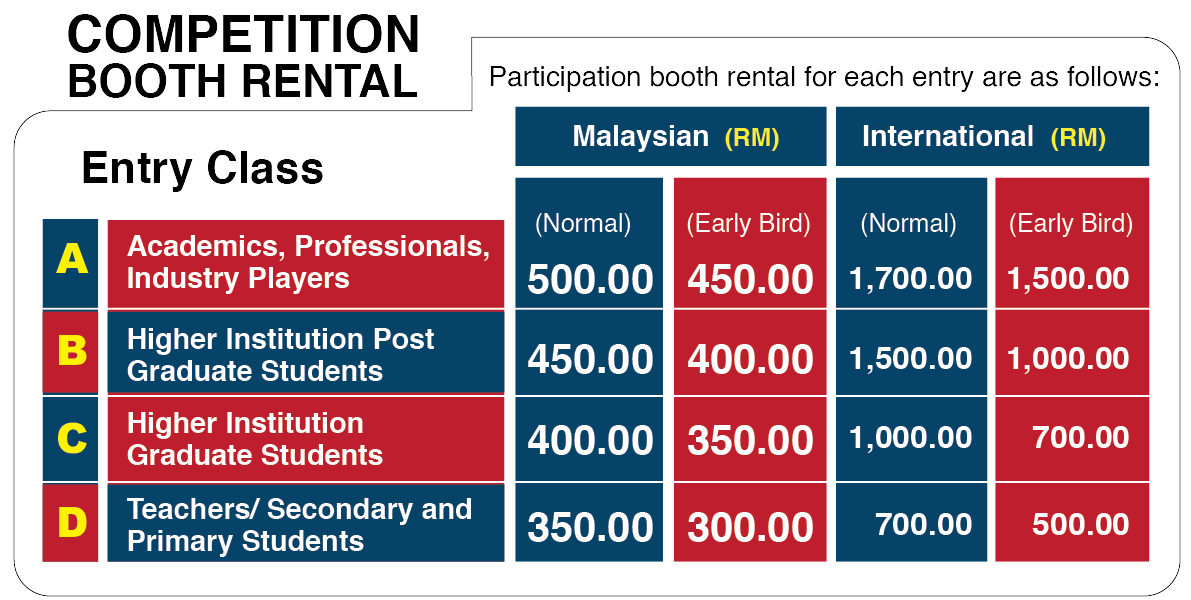For the Edu@Innovate 2025 Competition, each participant will be assigned a 1m x 1m booth to showcase their innovation for judging.
*The illustration below is a rough sketch for the booth that will be provided. The final product might not be exact.


Cluster 1: Pedagogy and Curriculum
Pedagogy refers to the art and science of teaching and learning. It encompasses the methods, strategies, and techniques used by educators to engage students, facilitate understanding, and promote active learning. Curriculum refers to the planned set of subjects, content, and learning objectives that students are expected to cover during their education. It outlines the scope and sequence of topics, learning standards, and intended outcomes for students.
Keywords:
- Pedagogical theory and instructional practice
- Curriculum as a program of learning
- Educational reform in curriculum and instruction
- Differentiating and personalizing instruction
- Teachers’ content knowledge or pedagogical knowledge
Cluster 2: Assessment and Evaluation
Investigates the processes of specifying educational outcomes and designing methods for measuring student learning, evaluating the effectiveness of educational interventions, or assessing the impact of educational programs on learners, teachers, institutions, and society.
Keywords:
- Purposes of assessment (diagnostic, formative, summative)
- The politics and practice of educational accountability
- Intelligence or ability, competence or capacity: what are the measurable ends of education?
- Assessment strategies (portfolio, adaptive, computer, embedded)
- Types of educational measurement (qualitative, quantitative; cognitive, affective, performance)
- Educational research methodologies (descriptive, experimental, participatory, action research)
- Program evaluation: purposes, strategies, role in educational reform
Cluster 3: Educational Organization and Leadership
Educational Organization and Leadership is a field of study and practice that focuses on understanding and improving the organizational structures, processes, and leadership within educational institutions. It is a multidisciplinary area that draws from education, management, sociology, psychology, and other related disciplines.
Keywords:
- Organizational Structure
- Administrative Processes
- Leadership Development
- School Improvement
- Educational Policy
- Organizational Culture
- Collaborative Partnerships
Cluster 4: Early Childhood Learning
Early Childhood Learning refers to the educational and developmental experiences that children undergo during the early years of their life, typically from birth to around eight years of age. This phase is crucial as it lays the foundation for a child future cognitive, social, emotional, and physical development.
Keywords:
- Play-Based Learning
- Developmentally Appropriate Practices
- Social and Emotional Development
- Language and Communication
- Pre-Reading and Pre-Math Skills
- Fine and Gross Motor Skills
- Parental Involvement
- Playgrounds and Learning Spaces
Cluster 5: Learning in Higher Education
Studies of tertiary or postsecondary education: institutional concerns (admissions, funding, scope and quality of educational offerings); instructional strategies and effectiveness with tertiary learners; the postsecondary learning environment. Also includes teacher education programs: their place in the university, how to prepare today’s pre-service teachers for tomorrow’s schools; issues of requirements, licensure, balancing theoretical and applied learning.
Keywords:
- Specialize in specific academic disciplines or professional areas
- Research skills and critical thinking abilities
- Higher education often incorporates practical and applied learning experiences
- Independent Learning and Self-Directed Study
- Collaboration and Interdisciplinary Learning
- Continuous assessment and feedback
- Prepares students for professional careers, personal growth, and active engagement in society
Cluster 6: Adult, Community, and Professional Learning
Explores adult learning in a variety of contexts, from adult basic education to workplace training and professional learning. Includes in-service and professional development for teachers.
Keywords:
- Flexible learning options to accommodate the diverse needs of adult learners
- Tailored to address specific challenges faced by adults in their personal and professional lives.
- Inclusive and accessible to individuals from various backgrounds and with diverse learning needs.
- Vocational education and training for the future
- Apprenticeship and other models of technical and further education
- Popular and community education
- Teacher in-service and professional development
Cluster 7: Learner Diversity and Identity
Learner diversity and identities refer to the wide range of individual differences and characteristics that students bring to the learning environment. These differences can be based on various factors, such as cultural background, socioeconomic status, language proficiency, learning styles, abilities, and personal experiences. Recognizing and embracing learner diversity is essential for creating an inclusive and effective educational experience that caters to the unique needs and strengths of each student.
Keywords:
- Inclusive Education
- Personalized Learning
- Cultural Awareness and Understanding
- Improved Learning Outcomes
- Reduced Achievement Gaps
- Positive School Climate
Cluster 8: Technologies in Learning
Technologies in learning, also known as educational technology or EdTech, refers to the integration and use of various technological tools, devices, software, and platforms to enhance the teaching and learning process. These technologies are designed to support educators, engage students, and facilitate the acquisition of knowledge and skills in more efficient and effective ways. Technologies in learning have the potential to transform traditional education and make learning more accessible, interactive, and personalized.
Keywords:
- Learning Management Systems (LMS)
- Online Learning Platforms
- Interactive Whiteboards and Smartboards
- Digital Content and E-Books
- Gamification
- Virtual Reality (VR) and Augmented Reality (AR)
- Video Conferencing and Webinars
- Educational Apps
- Artificial Intelligence (AI) in Education
- Online Collaboration Tools
Cluster 9: Literacies Learning
Literacies learning refers to the acquisition and development of various literacies or skills that enable individuals to effectively navigate and engage with the complexities of the modern world. Traditionally, literacy was associated with the ability to read and write, but in todays context, literacies encompass a broader range of skills necessary for active participation in society, work, and personal life. As the world becomes more digitally connected and information-driven, literacies learning has evolved to include digital literacy, media literacy, information literacy, and other essential skills.
Keywords:
- Reading and Writing Literacy
- Digital Literacy
- Media Literacy
- Information Literacy
- Numeracy
- Financial Literacy
- Health Literacy
- Cultural Literacy
Cluster 10: Science, Mathematics and Technology Learning
Science, Mathematics, and Technology Learning refer to the educational process of acquiring knowledge and skills in the fields of science, mathematics, and technology. These three subjects are interconnected and play crucial roles in our understanding of the natural world, technological advancements, problem- solving, and innovation. Education in science, mathematics, and technology equips learners with foundational knowledge and critical thinking abilities that are essential for various academic and professional pursuits.
Keywords:
- Foundational Knowledge
- Critical Thinking and Problem-Solving
- Technological Competence
- Innovation and Creativity
- Interdisciplinary Connections
- Teachers’ pedagogical content knowledge
- Preparation for STEM Careers
Cluster 11: Innovative Product
An innovative product in education refers to a novel and creative solution or tool that leverages technology, pedagogy, or instructional design to address specific educational challenges or enhance the teaching and learning experience. These products are designed to be cutting-edge, user-friendly, and effective in achieving their intended educational objectives. Innovative products in education often incorporate elements of digital technology, artificial intelligence, data analytics, gamification, and other emerging trends to revolutionize the learning process. These products can cater to various aspects of education, such as content delivery, assessment, student engagement, teacher support, and administrative efficiency.
Keywords:
- Foundational Knowledge
- Critical Thinking and Problem-Solving
- Technological Competence
- Innovation and Creativity
- Interdisciplinary Connections
- Providing personalized learning pathways and addressing knowledge gaps
- Improve Learning Outcomes
- Support Teacher Efficiency
- Increase access to education
Cluster 12: Entrepreneurship Education
Entrepreneurship Education focuses on equipping participants with the skills, knowledge, and mindset needed to turn creative ideas into viable business ventures. This educational cluster typically covers key areas such as business planning, market research, financial management, and pitching techniques. By providing practical training and mentorship, entrepreneurship education helps individuals understand the entrepreneurial process, navigate challenges, and effectively launch and grow their own startups. In an innovation competition, this education is crucial for transforming innovative concepts into successful, scalable businesses.
Keywords:
- Business Planning
- Startup Development
- Market Research
- Financial Management
- Pitching Techniques
- Innovation Strategy
- Venture Creation
- Business Model Design
- Entrepreneurial Mindset
- Risk Management
- Funding Strategies
- Mentorship
- Scaling Up
- Product Development
- Networking
- Value Proposition
Cluster 13: Human Capital Innovation
Human capital innovation focuses on leveraging and enhancing the skills, knowledge, and talents of individuals to drive progress and success in an innovation competition. This cluster emphasizes the importance of investing in people through education, training, and development to foster creativity, problem-solving, and leadership. By prioritizing the growth and effective deployment of human resources, organizations and individuals can unlock new ideas, improve collaboration, and enhance their overall capacity for innovation. In a competition setting, this means recognizing and nurturing the potential of participants to generate and execute groundbreaking solutions.
Keywords:
- Talent Development
- Skills Enhancement
- Knowledge Management
- Workforce Training
- Leadership Development
- Creativity Boost
- Human Resource Strategy
- Skillset Optimization
- Employee Engagement
- Innovation Capacity
- Learning and Development
- Talent Acquisition
- Collaboration Enhancement
- Professional Growth
- Capability Building
Cluster 14: Technical & Vocational
Technical and Vocational Education focuses on equipping learners with practical skills, hands-on training, and industry-relevant knowledge to prepare them for specific trades, careers, or technical fields. This cluster emphasizes the integration of theoretical knowledge with applied skills, ensuring that learners can meet the demands of rapidly evolving industries. Technical and vocational education plays a critical role in addressing workforce needs, enhancing employability, and promoting sustainable economic growth.
Keywords:
- Industry-Relevant Skills
- Practical and Hands-On Training
- Apprenticeships and Internships
- Career-Focused Learning
- Trade Certification
- Workplace Readiness
- Competency-Based Education
- Lifelong Learning in Technical Fields
- Bridging the Skills Gap
- Collaboration with Industry Partners
- Innovation in Technical Training
- Digital and Emerging Technologies Integration
- STEM Applications in Vocational Training
- Entrepreneurship in Technical Fields
- Job Market Alignment
JUDGING CRITERIA
The judges’ evaluations will be based on these criteria:
- Innovation/Invention
- The innovation/invention’s novelty, contribution to society, readiness, commercialization potential and usefulness are highlighted.
- Poster
- The content of the poster is sufficiently and clearly described. The poster’s presentation is also creative, appealing, and catchy.
- Pitching
- Deliver a pitching session effectively and creatively.
- Presentation Duration : 10 mins + 5mins(Q&A)
POSTER DETAILS
- Participant must provide a poster of own product/innovation/invention.
- Poster size: A0
- Content of Poster:
1) Innovation Background
2) Novelty
3) Contribution to Society
4) Commercialization Potential
5) Product
6) Others

Surat Penglibatan Pegawai Perkhidmatan Pendidikan Kementerian Pendidikan Malaysia dalam International Education Innovation Competition (Edu@Innovate) Tahun 2025 –
Surat Penglibatan Pegawai Perkhidmatan Pendidikan Kementerian Pendidikan Malaysia dalam International Education Innovation Competition (Edu@Innovate) Tahun 2025 –


